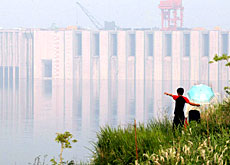
Multinationals urged to prevent conflict

International companies are increasingly operating in dangerous environments, even in conflict zones such as Iraq.
A Swiss security expert says there is scope for them to play a greater role in conflict prevention.
Daniele Ganser of the Centre for Security Studies at the Federal Institute of Technology in Zurich says businesses may themselves trigger national conflicts, and have a duty to help resolve them.
swissinfo: Multinational companies are expected to meet ecological and social criteria. And now we are expecting them to act as peacekeepers, is this right?
Daniele Ganser: Globalisation has made many companies international players, which are increasingly confronted with violent conflicts. Trade, for example in diamonds, often directly funds conflicts.
swissinfo: What role do private companies play in these violent conflicts?
D.G.: It often happens that international companies fuel conflicts, whether by supporting dictatorships, indirectly financing rebel groups or being involved in local corrupt businesses.
Let’s take the so-called “blood diamonds” from Angola. The sale of these diamonds to Europe financed a long and terrible civil war in the country. There was a direct and obvious link between war and business, but the diamond trader, De Beers, only changed its practices after it came under fire from non-governmental organisations.
Another example is the Swiss lingerie producer, Triumph. Some of the company’s production was in Myanmar, where the military dictatorship violates human rights.
Human rights activists constantly criticised Triumph for its practices and the company finally had to bow to pressure and stop its production in Myanmar.
swissinfo: But there are still negative examples. Nestlé has come under fire for its drinking water business in Brazil and Swiss engineering group ABB is involved in the controversial Three Gorges dam project in China.
D.G.: The prospect of making a good profit will always be important to a company – no matter whether it means damaging the environment or triggering violent conflicts.
But private companies should also think about all the factors involved and they should not forget about the damage they can do.
If drinking water is privatised and big companies buy the global rights to it and make business out of it, then we will have wars about water, as we have wars about oil at the moment.
swissinfo: Your project researches the potential of firms to prevent conflicts. What do you advise Swiss companies to do?
D.G.: We don’t act as advisers telling industry what to do. Our research field is still very new.
We try to find out where individual companies have links to violence, and whether these links promote or reduce violence. We are looking for specific examples of where a change in business activity has helped reduce violence.
swissinfo: So, you are expecting companies to identify links to violence before human rights organisations discover them and make them public?
D.G.: That’s right. Our research is based on the legitimate self-interest of private companies. But concern about the company’s image is not the only thing that makes private industry more careful. That would be too shortsighted.
Companies are also interested in the general security situation in a country. For most global and Swiss business, peace and security are a basic requirement.
swissinfo: Who is involved in your project?
D.G.: We talk to all Swiss multinational companies – from the Swiss-Swedish engineering group ABB to the pharmaceutical company Novartis and Switzerland’s biggest bank, UBS.
What we get out of the project at the end of the day will depend on the people involved, what position they have in their companies and whether they can influence management.
swissinfo: How much can a company demand from a government?
D.G.: The relationship between private industry and the government of a foreign country is always difficult because they are not on the same level. An entrepreneur is a private person and does not represent his or her government.
But businesspeople have a certain power as they can tell governments that they are prepared to invest in a country if the government stops torturing people, for example.
I am convinced that this would have some clout, as governments would worry about companies withdrawing from their country.
Another possibility is to stop trading in certain goods, such as blood diamonds, landmines or other conflict goods.
swissinfo-interview: Katrin Holenstein
For most multinational companies peace and security are a prerequisite for doing business.
According to Daniele Ganser, private companies sometimes trigger internal conflicts in the countries in which they operate.
Ganser says that American privatised military firms have boomed since the war in Iraq, providing protection to embassies, headquarters and military institutions.
One example is Blackwater Securities: four of the company’s employees were killed and mutilated in the Iraqi town of Falluja at the end of March.
Ganser estimates there are about 15,000 foreign security agents in Iraq.
They can earn between $500 and $1,500 per day.

In compliance with the JTI standards
More: SWI swissinfo.ch certified by the Journalism Trust Initiative





























You can find an overview of ongoing debates with our journalists here . Please join us!
If you want to start a conversation about a topic raised in this article or want to report factual errors, email us at english@swissinfo.ch.